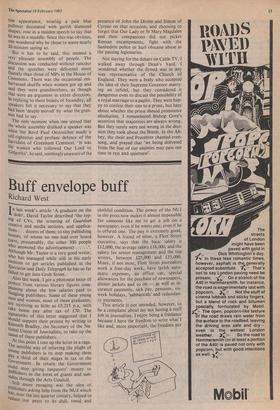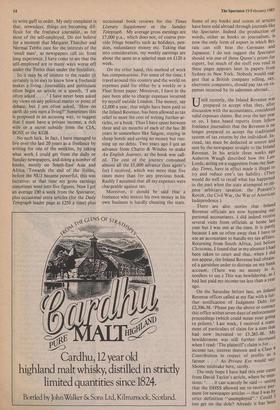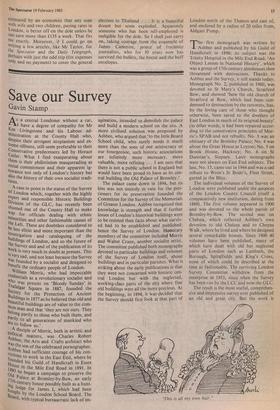Buff envelope buff
Richard West
In David Taylor described 'the typ- ing last week's article 'A graduate on the ing of CVs, the scouring of Guardian creative and media sections, and applica-
tions dozens of them; to tiny publishing (save, of whom no one had ever heard °aye, presumably, the other 300 people
who answered the advertisement) '. Although Mr. Taylor is a very good writer, who has managed while still in his early twenties to get articles published in the Spectator and Daily Telegraph he has so far failed to get into Grub Street. Also last week, I got a photostat letter of Protest from various literary figures com- plaining about the low salaries paid to fledgling publishers. Some of these young men and women, most of them graduates, are receiving as little as £5,215 p.a, with take home pay after tax of £70. The signatories of this letter suggested that I should support their protest by writing to Kenneth Bradley, the Secretary of the Na- tional Union of Journalists, to take up the cause of these publishers. At this point I tore up the letter in a rage. rhe sensible way of relieving the plight of Young Publishers is to stop making them Pay a third of their wages in tax to the Government. In return the Government eould stop giving taxpayers' money to publishers in the form of grants and sub- sidies through the Arts Council. Still more enraging was the idea of publishers asking help from the NUJ which has, over the last quarter century, helped to reduce our press to its dull, timid and slothful condition. The power of the NUJ in the press now makes it almost impossible for someone like me to get a job on a newspaper; even if he wants one; even if he is offered one. The pay is extremely good, however. A friend of mine, a Fleet Street executive, says that the basic salary is £12,000, the average salary £18,000, and the salary for senior management and the top writers, between £25,000 and £35,000. Many, if not most, Fleet Street journalists work a four-day week, have lavish auto- matic expenses, an office car, special allowances for the purchase of newspapers, dinner jackets and so on — as well as in- surance payments, sick pay, pensions, six- week holidays, 'sabbaticals' and redundan- cy payments.
This article is not intended, however, to be a complaint about my not having a staff job in journalism. I enjoy being a freelance because I have the freedom to write what I like and, more important, the freedom not to write guff to order. My only complaint is that, nowadays, things are becoming dif- ficult for the freelance journalist, as for most of the self-employed. Do not believe for a moment that Margaret Thatcher and Normal Tebbit care for the interests of the `small man', as newspapers call us: from long experience, I have come to see that the self-employed are in many ways worse off under the Tories than under the Socialists.
So it may be of interest to the reader (it certainly is to me) to know how a freelance makes a living. Journalists and politicians often begin an article or a speech, 'I am often asked . . I have never been asked my views on any political matter or point of debate, but I am often asked, 'How on earth do you earn a living?' Sometimes this is proposed in an accusing way, to suggest that I must have a private income, a rich wife or a secret subsidy from the CIA, BOSS or the KGB.
No such luck. In fact, 1 have managed to live over the last 20 years as a freelance by writing for one of the weeklies, by taking what work I could get from the daily or Sunday newspapers, and doing a number of books, mostly on South-East Asia and Africa. Towards the end of the Sixties, before the NUJ became powerful, this was lucrative: at that time my gross earnings sometimes went into five figures. Now I get an average £90 a week from the Spectator, plus occasional extra articles (for the Daily Telegraph leader page at £250 a time) plus occasional book reviews for the Times Literary Supplement or the Sunday Telegraph. My average gross earnings are £7,000 p.a., which does not, of course pro- vide fringe benefits such as holidays, pen- sion, redundancy money etc. Taking that into consideration, my weekly earnings are about the same as a salaried man on £120 a week.
On the other hand, this method of work has compensations. For some of the time, I travel around this country and the world on expenses paid for either by a weekly or a Fleet Street paper. Moreover, I have in the past been able to charge expenses incurred by myself outside London. The money, say £2,000 a year, that might have been paid to the Inland Revenue, has been allowed as tax relief to meet the cost of writing further ar- ticles, or a book. Thus I have spent between three and six months of each of the last 20 years in somewhere like Saigon, staying in cheap hotels and saving no money but run- ning up no debts. Two years ago 1 got an advance from Chatto & Windus to make An English Journey, as the book was call- ed. The cost of the journey consumed almost all the £5,000 advance (less agent's fee) I received, which was more than five times more than for any previous book. Rashly I assumed that all my expenses were chargeable against tax.
Moreover, it should be said that a freelance who invests his own money in his own business is hardly cheating the state.
Some of my books and scores of articles have been sold abroad through journals like the Spectator. Indeed the production of words, either as books or journalism, Is now the only form of export in which Bri- tain can still beat the Germans and Japanese. I do not suggest the Spectator should win one of those Queen's prizes for export, but much of the stuff you read in these pages appears later in papers from Sydney to New York. Nobody would sug- gest that a British company selling, say, electronic computers, should pay tax on ex- penses incurred by its salesmen abroad.
Until recently, the Inland Revenue was prepared to accept what they, after discussion with the accountants, considered valid expenses claims. But over the last year or so, I have heard reports from fellow freelance journalists that the Revenue is no longer prepared to accept the traditional system of tax returns by the individual. In- stead, tax must be deducted at source and sent by the newspaper straight to the Inland Revenue. In his article three weeks ago Auberon Waugh described how the Law Lords, acting on a suggestion from the Sun- day Times, have in effect made it illegal to try and reduce one's tax liability. (They would do well to recall what has happened in the past when the state attempted to pose arbitrary taxation: the Peasant's Revolt, the Civil War, the War of American Independence.) There are also stories that Inland Revenue officials are now bypassing our personal accountants. I did indeed receive several visits from officials at home last year but I was out at the time. It is partly because I am so often away that I have to use an accountant to handle my tax affairs. Returning from South Africa, just before Christmas, I found that in my absence I had been taken to court and that, when I did not appear, the Inland Revenue had obtain- ed a garnishee order to distrain on my bank account. (There was no money in it, needless to say.) This was bewildering, as I had last paid my income tax less than a Year ago. On the Saturday before last, an Inland Revenue officer called at my flat with a fur- ther notification of Judgment Debt for £2,396.38. 'Please pay the above or contact this office within seven days of enforcement proceedings (which could mean your going to priSon).' Last week, I received a state- ment of particulars of claim for a sum that had now increased to £3,263.48. MY bewilderment was still further increased when I read: `The plaintiff's claim is for . - income tax, interest thereon and a Class 4 Contribution in respect of profits as a farmer . . .' As Private Eye would saY• Shome mishtake here, surely.
The only hope I have had this year came from David Taylor's article, where he men-
tions: . . it can scarcely be said — seeing that the DHSS allowed me to receive pay- ment for newspaper articles — that I was by strict definition "unemployed".' Could I too get on the dole? Already it has been estimated by an economist that any man with wife and two children, paying rates in London, is better off on the dole unless he can earn more than £135 a week. That fits Me exactly. Moreover, if I could go on writing a few articles, like Mr Taylor, for the Spectator and the Daily Telegraph, Perhaps with just the odd trip (for expenses Only and no payment) to cover the general
election in Thailand . . . It is a beautiful dream but soon exploded. Apparently someone who has been self-employed is ineligible for the dole. So I shall just carry on, taking courage from the exaample of James Cameron, prince of freelance journalists, who for 50 years now has survived the bullets, the booze and the buff envelopes.








































 Previous page
Previous page